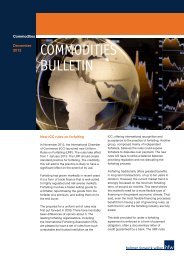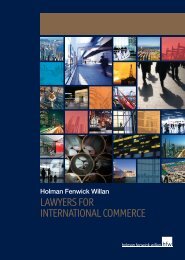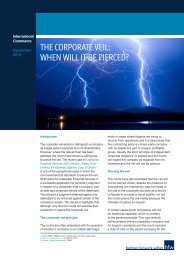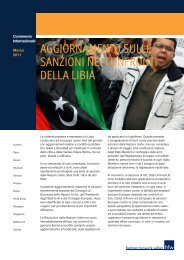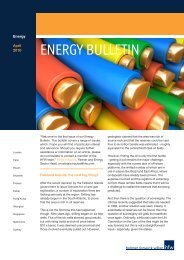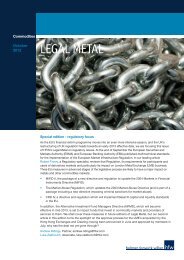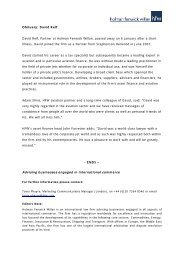Download file as PDF - HFW
Download file as PDF - HFW
Download file as PDF - HFW
You also want an ePaper? Increase the reach of your titles
YUMPU automatically turns print PDFs into web optimized ePapers that Google loves.
Commodities<br />
March<br />
2011<br />
LETTERS OF CREDIT:<br />
LIABILITIES OF ISSUING BANKS<br />
London<br />
Paris<br />
Rouen<br />
Brussels<br />
Geneva<br />
Piraeus<br />
Dubai<br />
Hong Kong<br />
Shanghai<br />
Singapore<br />
Melbourne<br />
Sydney<br />
In February 2011 we reported on the UK<br />
Court of Appeal’s judgment in Fortis Bank and<br />
Stemcor UK Limited v Indian Overse<strong>as</strong> Bank<br />
[2010] EWCA Civ 58, in which the Court of<br />
Appeal provided guidance on the interpretation<br />
of provisions of the Uniform Customs Practice<br />
of Documentary Credit (“UCP”) 600 and,<br />
in particular, that when an issuing bank<br />
gives notice that it is returning discrepant<br />
documents presented under a letter of credit,<br />
it is under an obligation to do so re<strong>as</strong>onably<br />
promptly.<br />
On 17 March 2011, the Commercial Court of<br />
England & Wales handed down its judgment<br />
in relation to another issue arising out of<br />
these proceedings: whether Stemcor w<strong>as</strong><br />
entitled to claim damages from the issuing<br />
bank, Indian Overse<strong>as</strong> Bank (“IOB”) in<br />
respect of port storage costs and container<br />
demurrage charges which Stemcor had to<br />
pay its carriers. The Court held that IOB w<strong>as</strong><br />
not liable to Stemcor in contract or restitution.<br />
As discussed below, the Commercial Court’s<br />
judgment is important in that it recognises<br />
that the liabilities of issuing banks must not<br />
be extended too far. It also provides useful<br />
guidance on what is meant by “re<strong>as</strong>onably<br />
promptly”.<br />
Background<br />
In summary, the facts of the c<strong>as</strong>e were <strong>as</strong><br />
follows.<br />
IOB had opened five letters of credit in favour<br />
of Stemcor under contracts for the sale of<br />
containerised scrap metal, with Fortis acting<br />
<strong>as</strong> the advising bank. The LCs were expressly<br />
subject to UCP 600. Stemcor made a number<br />
of drawings under each of them. Stemcor<br />
presented the documents under LCs 1-3 which<br />
Fortis accepted and paid Stemcor the amount<br />
due. The documents were forwarded to IOB.<br />
The documents presented under LCs 4-5 were<br />
also forwarded by Fortis to IOB.<br />
IOB rejected the documents on the b<strong>as</strong>is<br />
of a number of discrepancies. It therefore<br />
refused to reimburse Fortis in respect of the
payments it had made under LCs<br />
1-3 and refused to make payment to<br />
Stemcor in respect of LCs 4-5. IOB<br />
issued a notice under sub-article<br />
16(c)(iii)(c) of UCP 600 stating that<br />
it w<strong>as</strong> returning the documents<br />
in respect of the v<strong>as</strong>t majority<br />
of the presentations. The goods<br />
covered by the letters of credit were<br />
ultimately left unclaimed at the<br />
port of Haldia and accrued storage<br />
charges and container demurrage<br />
costs. Stemcor claimed against IOB<br />
in respect of these costs, firstly <strong>as</strong><br />
damages arising from IOB’s wrongful<br />
delay in making payment under the<br />
letters of credit, alternatively by way<br />
of a restitutionary remedy.<br />
Claim in contract<br />
In considering Stemcor’s claim for<br />
breach of contract, Jonathan Hirst<br />
QC, sitting <strong>as</strong> a Deputy Judge of<br />
the High Court, considered the<br />
alleged breaches in relation to LCs<br />
1-3 and LCs 4-5 separately. In<br />
relation to LCs 1-3, it w<strong>as</strong> held that<br />
under the terms of the LCs, once<br />
Fortis had confirmed the letters of<br />
credit and paid the amounts due,<br />
IOB’s obligation w<strong>as</strong> to reimburse<br />
Fortis. Whilst IOB w<strong>as</strong> in breach of<br />
its obligation to reimburse Fortis,<br />
this obligation w<strong>as</strong> not owed to<br />
Stemcor and accordingly Stemcor<br />
could not claim damages for breach<br />
of contract under LCs 1-3. In any<br />
event, it w<strong>as</strong> held that any breach<br />
of contract by IOB could not be<br />
said to have caused the loss <strong>as</strong><br />
Stemcor w<strong>as</strong> unable to prove that<br />
if IOB had honoured any obligation<br />
to make payment, the buyer would<br />
have taken up the goods. In fact,<br />
the judge considered that the buyer<br />
would have been unlikely to do so<br />
given the collapse in the market price<br />
at the time. Accordingly, Stemcor’s<br />
claim for breach of contract failed in<br />
respect of all of the LCs.<br />
Re<strong>as</strong>onable promptness<br />
In relation to LCs 4-5, it w<strong>as</strong> held<br />
that, following the Court of Appeal’s<br />
judgment, IOB had committed clear<br />
breaches of contract in failing to<br />
return the documents re<strong>as</strong>onably<br />
promptly. Jonathan Hirst QC, in his<br />
decision, provided useful guidance<br />
on the Court of Appeal’s conclusion<br />
that an issuing bank who had issued<br />
a notice that it w<strong>as</strong> returning the<br />
discrepant documents w<strong>as</strong> under<br />
an obligation to do so “re<strong>as</strong>onably<br />
promptly”, stating that “in the<br />
absence of special extenuating<br />
circumstances, a bank which failed to<br />
despatch the documents within three<br />
banking days would have failed to act<br />
within [sic] re<strong>as</strong>onable promptness.”<br />
This is a helpful clarification <strong>as</strong><br />
the Court of Appeal’s requirement<br />
of re<strong>as</strong>onable promptness w<strong>as</strong><br />
ambiguous and required refinement,<br />
<strong>as</strong> discussed in our February 2011<br />
briefing. The period of three banking<br />
days is fairly short and banks should<br />
bear this in mind when considering<br />
discrepant documents.<br />
However, the difficulty with the<br />
Commercial Court imposing such<br />
a specific time limit for returning<br />
the documents is that this limit<br />
will not necessarily be applied<br />
in other jurisdictions, which may<br />
not be aware of or which may not<br />
wish to follow the decision of the<br />
English Court. This undermines the<br />
international nature and the intended<br />
uniform application of the UCP 600.<br />
Claim in restitution<br />
Stemcor argued in the alternative<br />
that it could recover the sums it<br />
had paid from IOB in restitution.<br />
Stemcor’s main argument in this<br />
regard w<strong>as</strong> that IOB w<strong>as</strong> liable<br />
for storage costs <strong>as</strong> consignee<br />
under the bills of lading. Stemcor<br />
submitted that <strong>as</strong> the letters of credit<br />
expressly required IOB to be named<br />
<strong>as</strong> consignee, IOB w<strong>as</strong> an initial<br />
party to the bills of lading and liable<br />
to pay the port storage charges and<br />
container demurrage. Jonathan Hirst<br />
QC held that a requirement under<br />
the letters of credit that the bills of<br />
lading be consigned to the order of<br />
IOB did not lead to the conclusion<br />
that IOB w<strong>as</strong> authorising Stemcor<br />
to enter into a contract on its behalf<br />
in terms of the bills of lading. If<br />
Stemcor’s arguments were correct,<br />
it would follow that whenever a bank<br />
required in a letter of credit that it<br />
is named <strong>as</strong> consignee in the bill of<br />
lading, it is authorising the shipper<br />
to contract on its behalf. Such a<br />
conclusion would be contrary to the<br />
well established regime under the<br />
Carriage of Goods by Sea Act 1992<br />
(“CoGSA”) which provides that the<br />
lawful holder of a bill of lading h<strong>as</strong> all<br />
rights of suit under the bill but is not<br />
subject to any of the liabilities under<br />
the bill unless he takes some step to<br />
enforce those rights, i.e. by taking or<br />
demanding delivery of the relevant<br />
goods or by making a claim under<br />
the contract of carriage. Accordingly,<br />
<strong>as</strong> IOB had not taken any steps to<br />
enforce its rights under the bills of<br />
lading, it w<strong>as</strong> not subject to any of<br />
the liabilities thereunder.<br />
The Commercial Court therefore<br />
concluded that all of Stemcor’s<br />
claims against IOB failed and if<br />
Stemcor w<strong>as</strong> to recover any of the<br />
port storage costs and container<br />
demurrage it had paid, such<br />
recovery must be from another party.<br />
02 Commodities
The Commercial Court’s judgment is<br />
important in that it recognises that<br />
the liabilities of issuing banks must<br />
not be extended too far. To do so<br />
would be to extend artificially the<br />
bank’s interest in a sale of goods<br />
beyond its role <strong>as</strong> a provider of<br />
credit and attribute it with some<br />
interest in the goods themselves.<br />
Indeed, the Commercial Court<br />
acknowledged that the issuing bank<br />
would not even know the terms of<br />
the bills of lading. The judgment also<br />
underlines the importance of CoGSA<br />
in international trade. Treating an<br />
issuing bank <strong>as</strong> an initial party to the<br />
bill of lading would be to circumvent<br />
the well established rules under<br />
CoGSA which are designed to avoid<br />
imposing liabilities in circumstances<br />
such <strong>as</strong> these.<br />
For more information, ple<strong>as</strong>e<br />
contact Guy Hardaker (pictured left),<br />
Partner, on +44 (0)20 7264 8249 or<br />
guy.hardaker@hfw.com, or Andrew<br />
Williams (pictured centre), Associate,<br />
on +44 (0)20 7264 8364 or<br />
andrew.williams@hfw.com, or<br />
Adam Richardson (pictured right),<br />
Associate, on +44 (0)20 7264 8015<br />
or adam.richardson@hfw.com or<br />
your usual contact at <strong>HFW</strong>.<br />
<strong>HFW</strong> acted for IOB in successfully<br />
defending the claim.<br />
“The Commercial Court’s judgment is important in that it<br />
recognises that the liabilities of issuing banks must not be<br />
extended too far. To do so would be to extend artificially the<br />
bank’s interest in a sale of goods beyond its role <strong>as</strong> a provider of<br />
credit and attribute it with some interest in the goods themselves.”<br />
Commodities 03
Lawyers for international commerce<br />
HOLMAN FENWICK WILLAN LLP<br />
Friary Court, 65 Crutched Friars<br />
London EC3N 2AE<br />
T: +44 (0)20 7264 8000<br />
F: +44 (0)20 7264 8888<br />
© 2011 Holman Fenwick Willan LLP. All rights reserved<br />
Whilst every care h<strong>as</strong> been taken to ensure the accuracy of this information at the time of publication, the information is intended <strong>as</strong> guidance only. It should not be<br />
considered <strong>as</strong> legal advice.<br />
Holman Fenwick Willan LLP is the Data Controller for any data that it holds about you. To correct your personal details or change your mailing preferences ple<strong>as</strong>e<br />
contact Craig Martin on +44 (0)20 7264 8109 or email craig.martin@hfw.com<br />
hfw.com



